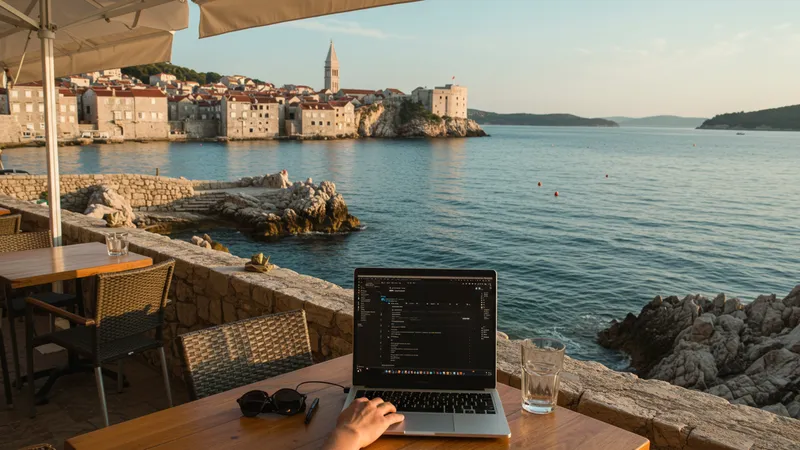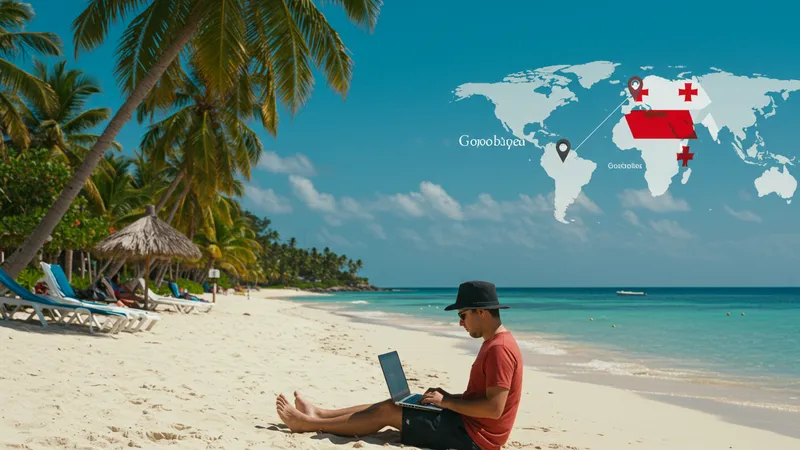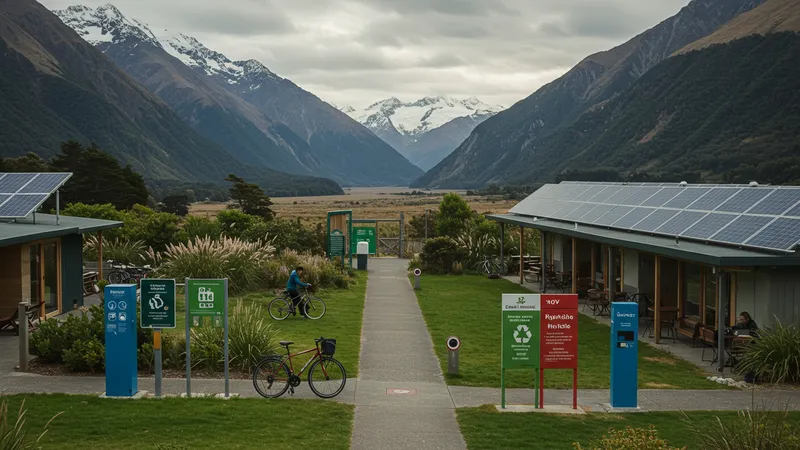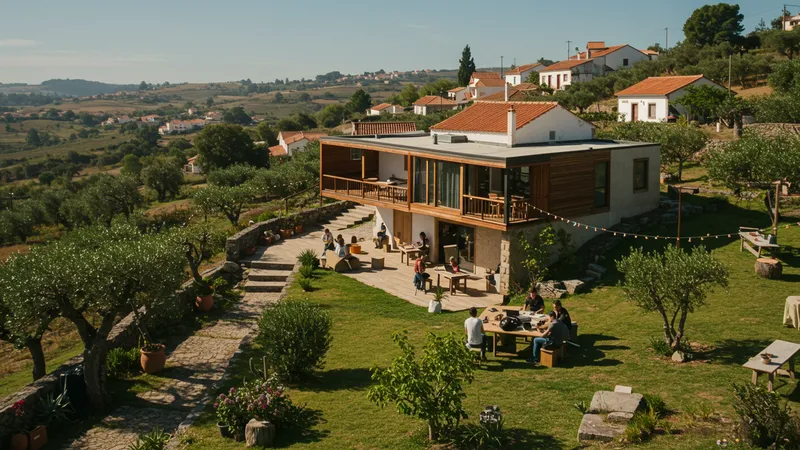

Imagine sipping a freshly cracked coconut on a sun-kissed beach while your laptop effortlessly connects you to the world. In 2025, this dream is no longer reserved for the wealthy or the reckless—it’s a growing reality for savvy digital nomads around the globe.
As more countries recognize the economic boost from remote workers, digital nomad visas have become more enticing than ever. This year might just be your perfect opportunity to trade rush hour traffic for tranquil sea breezes. But what sets the best apart from the rest?

Digital nomad visas aren’t just bureaucratic stamps—they represent a seismic shift in how nations court and cater to today’s mobile workforce. Just last year, Portugal’s Golden Visa program created newly prosperous coastal communities. But that’s not even the wildest part…
Some places are not only offering visas but are also throwing in the lure of tax breaks, cultural exchange programs, and even tech-enhanced coworking spaces. Yes, the very concept of how and where we work is being reimagined. What’s next? Even traditional corporate giants are taking notes. What happens next shocked even the experts…
Colombia has emerged as a dark horse in the digital nomad community. Unlike the usual suspects, Colombia’s digital nomad visa offers something unique: a vibrant culture coupled with a burgeoning tech scene. The country provides a residency opportunity with minimal financial prerequisites, making it an enticing proposition.

But there’s more to it than affordability. The Colombian government, keen to bolster its innovation ecosystem, has introduced tax incentives specifically for tech entrepreneurs. Now, digital workers can leverage this opportunity to expand their ventures with far fewer overhead costs. However, what’s fascinating is how the local communities have adapted.
In Medellín, co-working spaces aren’t just about high-speed internet, they’re about fostering collaboration between locals and tourists. It’s not uncommon to find technology meetups inspired by this cultural fusion, offering unique insights and collaborations. But there's one more twist coming that could change everything.
With an emphasis on balanced living, Colombia has been investing in professional development programs for nomads. These initiatives allow individuals to gain more than just a temporary home; they gain skills that can transport their careers globally. But why is this only the beginning of Colombia’s digital transformation journey?
Imagine navigating the cobblestone streets of Lisbon, iced coffee in hand, with a flexible work schedule that allows you to explore Portugal’s sunny coastlines at leisure. The new Portuguese residency options for digital nomads, with their quick approval processes, have turned this daydream into a feasible reality.

Portugal’s D7 Visa, renowned for its simplicity, is a no-brainer for internet-based professionals who crave a mix of scenic landscapes and modern conveniences. But the true magic happens with community initiatives aimed at blending cultures. Nomads living here find more than just a good Wi-Fi connection.
These initiatives create a platform that encourages meaningful exchanges between nomads and locals. Sharing workspace becomes sharing meals, and before long, sharing customs. Lisbon has become a hub for technology forums and international workshops. Could the blend of tech and tradition get any more enticing?
And it seems Lisbon’s appeal doesn’t just rest with individuals. Startups are now planning retreats here to inspire their teams. An unexpected consequence is the rise in creative collaborations sparked under the warm Iberian sun. Surely, there’s more to unfold as Lisbon redefines European living for digital wanderers.
Thailand and Vietnam are now on the radar for adventurous remote workers looking for a fresh scene. While Bali has long been the go-to for sun and surf, these countries are slowly stealing the limelight with their accessible lifestyle and burgeoning expat communities.

Bangkok, once just a transit hub, is embracing its reputation as a digital innovation center. Thailand offers a SMART Visa, tailored to professionals in fields poised for growth. An affordable cost of living combined with rich cultural experiences make it an irresistible option.
Meanwhile, Vietnam’s nascent visa program for digital nomads promises not just beauty but also emerging opportunities in its thriving cities like Ho Chi Minh City. Entrepreneurs are finding fertile ground here to incubate their startups, away from the glaring limelight of traditional tech cities.
As more professionals spill their secrets on how these destinations amplify their career and life satisfaction, you might rethink traditional working environments. This is only the beginning of Asia’s prominence as the digital epicenter. And waiting on the horizon is a change you never expected.
Amid the tapestry of cultural history, Eastern Europe emerges as a curious contender gaining a foothold within the digital nomad realm. Countries like Croatia and Estonia have crafted visas that cater specifically to the tech-driven individual.

Croatia’s approach is particularly novel, offering a one-year residence visa that doesn’t require a local sponsor. Combined with the Adriatic coast’s stunning backdrop, it's surprising how much Croatia has evolved as a hotspot for digital life.
The Estonian e-Residency program further breaks physical boundaries by offering digital identity to remote entrepreneurs, unlocking EU business banking and cross-border ventures without upheaval. The benefits stretch beyond mere convenience.
While these Eastern European nations weave their unique cultural heritage into the present, they are also cleverly positioning themselves at the forefront of the digital revolution. But the next part of that story is taking the tech world by storm.
Who wouldn’t want the chance to pocket more of their hard-earned cash? Some digital nomad visas are offering just that through enticing tax incentives. Countries in the Caribbean, as well as nations like Georgia, are drawing in freelancers with the promise of fewer fiscal obligations.

Barbados, for instance, offers a visa that comes with a year’s tax exemption for work done outside the island. Imagine relaxing on its sandy shores while significantly reducing your tax liabilities. But Georgia’s remote worker incentives take this to another level.
Recognized as one of the world’s easiest places to start a business, Georgia offers one of the most competitive tax landscapes on the globe. Unsurprisingly, it has become a sought-after sanctuary for both startups and established digital nomads alike.
The race is on as more nations recognize the economic boom these innovative policies foster. But could these tax breaks lead to unforeseen competition among digital nomads? We’re only beginning to see the light of what this might bring.
Many digital nomads are discovering that travel is more rewarding when engagement is deeper. Several countries have introduced cultural immersion programs designed to enrich the experiences of temporary residents.

In Japan, initiatives focused on regional revival offer nomads the chance to live in picturesque rural settings while working on local projects. This not only supports community development but also broadens the cultural horizons of the visiting professionals.
Similarly, Italy is on board with residential programs in which nomads become part of sustainable living associations, merging professional life with environmental stewardship. The connection to local culture often translates into creative inspiration.
The intertwining of work and culture in these settings sets the stage for an immersive experience, but does cultural richness translate to greater innovation in work? The ensuing implications could be transformative.
In the face of climate change, sustainability isn’t just an afterthought for countries vying for digital nomads. Some places, like New Zealand, incorporate environmental impact considerations into their visa incentives.

New Zealand’s remote worker visa pairs with eco-focused living options, such as incentives for using green accommodations or carbon offset schemes. The stunning landscapes aren’t just for sightseeing; they represent nature that needs to be preserved.
Countries like Denmark have integrated bike-sharing programs into their urban designs, aligning green policies with nomad-friendly initiatives. These programs reduce carbon footprints and promote healthier lifestyles.
This global wave of eco-conscious visas could redefine professional commitments, urging us to rethink our travel’s environmental impact. Could the next leap for digital nomads be intertwined with leading sustainability efforts?
Beyond work-life balance, how about work-wellness balance? Nations are turning to health perks as a new battlefield for attracting digital nomads, redefining what visa holders can expect.

Indonesia’s latest offering includes wellness initiatives like subsidized yoga and meditation retreats, allowing nomads to start or end their workdays with profound peace of mind.
Meanwhile, countries like South Korea are integrating modern medical opportunities into their visa programs, ensuring that healthcare access isn’t just an expatriate luxury but an affordable reality for all.
These groundbreaking approaches invite success through mindfulness and innovation. Will a consistent focus on wellness influence new business models for nomadic workers? The unfolding story suggests it might already be happening.
What if working remotely meant rethinking office spaces altogether? Enter digital revolution retreats, which combine travel with tech incubation.

Portugal’s techno-retreats, where nomads exchange ideas against the backdrop of rolling villages, are proving that innovation and relaxation can be a powerful combination.
Moreover, Estonia and Latvia are fostering joint initiatives that serve as melting pots for people to launch new ventures while enjoying tranquil Nordic environments.
These retreats aren’t just about unplugging—they’re changing the very nature of how and where great ideas are born. But how will these revolutionized spaces evolve over time, and what new landscapes will they discover?
As remote working may often feel unsteady, local networks are rising to bridge the gap, offering digital nomads a sense of community and belonging wherever they venture.

In Greece, the digital nomad visa program fosters relationships between visiting professionals and local entrepreneurs, creating mutual growth and shared vision.
The sense of fellowship in these networks often leads to unexpected opportunities and collaborations that surpass individual endeavors. It’s about creating a supportive environment where new ideas can sparkle and grow.
As these local networks continue to thrive, might they become the backbone of future innovation across diverse regions? The challenges and opportunities are evolving as you read this.
Beyond the immediate allure of tropical paradises and vibrant cityscapes, what about laying down digital roots for the long term?

Countries like Malta and Cyprus are anticipating this shift by offering longer-term routes for residency, paving a path for nomads to transition into permanent fixtures.
This evolving landscape could redefine traditional career choices, allowing individuals and families to capitalize on opportunities globally without uprooting each time.
The ongoing evolution of these policies raises questions about the future stability of free-roaming work lifestyles. What new horizon will these choices open for aspiring digital nomads?
A behind-the-scenes network of support is unveiling new possibilities in the realm of digital nomadism through tech alliances.

Mission-driven organizations are forming alliances with local governments to enhance infrastructure for workers and provide technological resources that allow entrepreneurs to excel.
Beyond immediate digital advancements, these partnerships are driving policy changes that align with the future needs of remote workers, making them technologically autonomous.
As these alliances grow and advance, they appear set to disrupt the traditional work dynamic from within, transforming it for generations to come. Yet, what new avenues will these dynamic shifts unlock?
The movement of digital nomads from one nation to another is giving rise to unexpected cultural transformations in countries worldwide.

Fusion events, like those seen at Thailand's Full Moon Parties, now incorporate cross-cultural elements brought by long-term visitors, forever altering local charm.
The infusion of global influences is reshaping cuisines, arts, and even local holidays to embrace a mosaic of traditions that move beyond borders and digital age barriers.
This globalized narrative invites deeper questions about identity and belonging in an increasingly connected world. What could this mean for local populations and their traditions?
As the allure of working from paradises worldwide continues to rise, experts predict even more compelling changes are on the horizon.
The innovative push toward multi-generational travel and accommodation options signals a trend where age isn’t a barrier for those who desire change.
The coming years will likely see digital nomadism evolve past the individual experience, embracing families and older professionals who want to claim their piece of the world.
With every new step, unexpected transformations promise to redefine remote work in enriching, diverse ways. But the journey into the nomadic tomorrow is just beginning—are you ready to explore?
In an era where freedom meets work, digital nomad visas are rewriting the rules of professional engagement. The merging of technology, travel, culture, and personal growth offers an adventure not just across borders, but into new ways of living. Whether you're dreaming of a Bali sunrise or a European summer, the path is open for exploration. So why wait? Share this journey with someone who dreams of basking in the same possibilities. Bookmark this guide to stay on top of the latest in remote living innovation. The paradise lifestyle has never been more within reach or irresistible—what will you discover next?